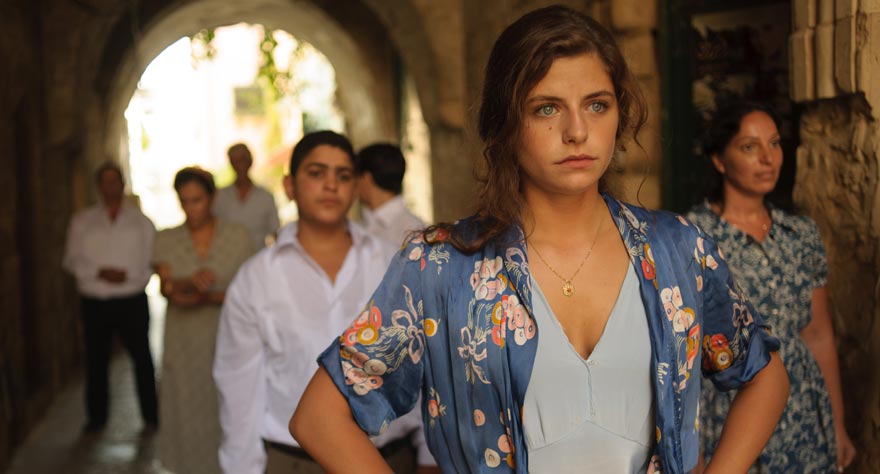
A longer run-time would have better-served this decent drama that uses real-life exile of 130,000 people as its backdrop.

A longer run-time would have better-served this decent drama that uses real-life exile of 130,000 people as its backdrop.
All the Toronto Jewish Film Festival entries I’ve had the privilege to screen (so far) have had strong historical themes. Dancing Arabs is set in late-’80s/early-’90s and offers references to the Gulf War. Closer to the Moon dramatizes real events that occurred in Romania in the late 1950s. The history of comic books in Israel is the subject of the decades-spanning documentary Hebrew Superheroes. And the Second Lebanon War is a considerable circumstance in Haven. Another Festival entry steeped in history—this one making its Canadian premiere—is The Dove Flyer. The film is a fictionalized drama that uses the historical exile of 130,000 Iraqi Jews in 1950-1951 as its main plot.
The film opens with Iraqi police storming the apartment of Salman (Igal Naor), looking for a cache of weapons they think is hidden there. They find nothing, but that doesn’t stop them from incarcerating Salman’s brother Hazkel, a journalist by day and leader of the underground by night. The underground’s mission is to organize transport for Jews out of Iraq and into Iran, with passage to Israel being the final destination. Hazkel’s arrest shatters his young wife Rachelle (Yasmin Ayun), and sets a series of events that forces teenager Kabi (Daniel Gad), Salman’s son, to become a key player in the underground movement.
While navigating the treacherous sociopolitical waters of the times, Kabi, a high school student, must go undercover to see his uncle in prison. He must also contend with a young friend who is leaning towards Communism (as opposed to the underground-friendly Zionism), manage two romances, and resist being swayed by several competing idealogical forces, all of which happen to be on the Iraqi-Jewish side of the fence, just in different sections.
So often, films run longer than they need to effectively tell their story. The Dove Flyer, though, is a film where the run-time could have—and should have—been twice as long. The story of real-life exile of 130,000 Iraqi Jews, some of whose families had lived in that region for over 2,500 years, is epic in scope. There’s so much story to be told here that even a simple adaptation should strain against the 108 minutes allotted. Once director Nissim Dayan, who cowrote the screenplay with Eli Amir (author of the novel on which the film is based), takes that hearty history and populates it with no fewer than seven significant characters and a handful of secondary players, the story becomes too much to manage in the context of that run-time. It’s unfortunate, because what’s told is compelling, well-acted, and beautifully lensed.
The film’s opening is perfect. Not only does it establish the granular conflict of Hazkel’s arrest and what that does to his family, it also sets an overarching, conflict-drenched, anti-Semitic tone that carries throughout the picture. The opening is jolting and commands your attention. But as characters and their interests/concerns get introduced, The Dove Flyer becomes super-saturated with too many important people and too many key moments.
What’s frustrating about this is that it’s all interesting and worthy of further development. But because so much happens, some scenes transition with a sense of ending abruptly just to get to the next scene. While other scenes begin with the assumption that the viewer will fill in any gaps the director doesn’t have the time to detail. This creates a feeling of being cheated out of something better.
At the center of The Dove Flyer is Kabi, the one character who interacts on some level with every other character in the film. He crosses paths with law enforcement. He follows his father’s orders while considering the advice of the men his father directs him to, even though what those men suggest often conflicts with his father’s intentions (or his own). He manages relationships with the emotional women in his life; his mother, his uncle’s wife, and his best friend’s sister. And he becomes the underground’s greatest asset, as he is utilized as the go-to person to both infiltrate the jail to communicate with his uncle and help scurry people out of Iraq.
Everyone does fine acting work, but Gad is the true star of the film, appearing in just about every scene. He is perfect for the role. His clean-cut appearance complements the altruism he shows in his character, while his youthfulness is the perfect mask for his character’s enhanced maturity. Also worthy of mention is Uri Gavriel, the actor who plays Abu Adwar, the father of Kabi’s best friend. His character attempts to manage an opposing point of view concerning the flight from Iraq, as well as Kabi’s greater intentions, his son’s interest in Communism, and the intentions of his teenage daughter. Abu Adwar balances these well and transitions through them effortlessly.
Shai Goldman’s cinematography is also worth calling out. There’s a great sharpness to every image that is consist along all lighting levels and color palates, even if those color palates are shrewdly limited. That sharpness is then muted; it isn’t softened, but rather there’s always a sense that something in the Iraqi air won’t let colors shine the way they should. It makes for effective, oppressive visuals.
The finished product that is the The Dove Flyer (also known as Farewell Baghdad) is a net-positive viewing experience, but a longer run-time would have better-served this drama. In fact, with Kabi at the core and so many other characters in his life, this is structured to be a terrific televised miniseries. If that ever comes to be, I’m tuning in.